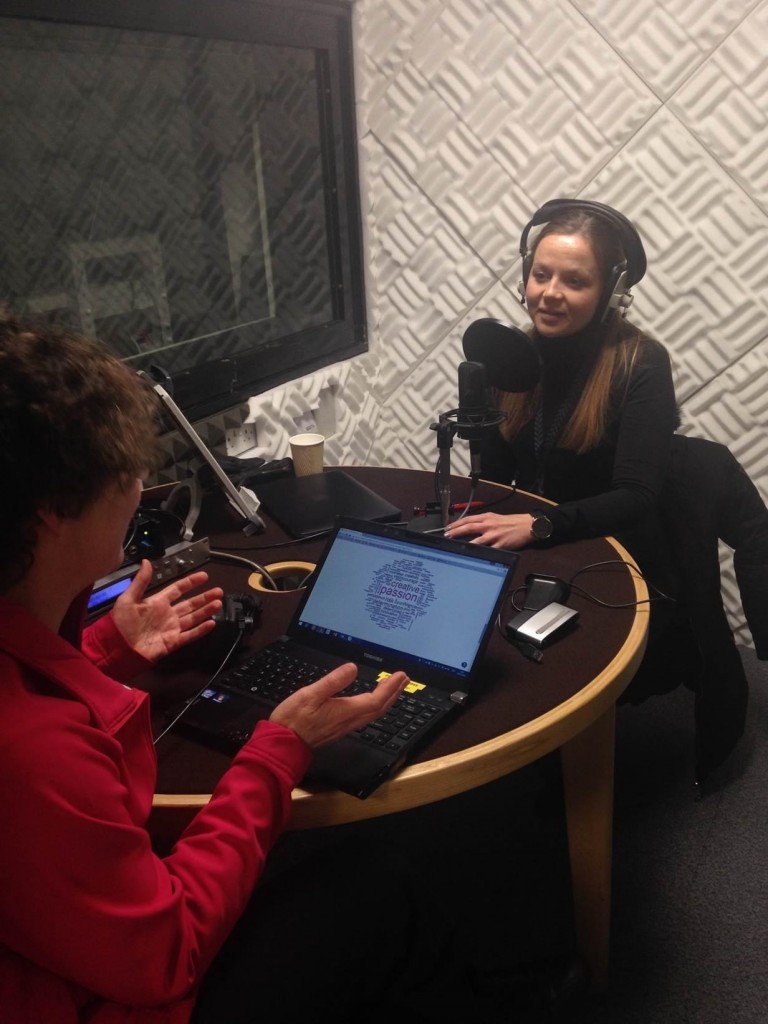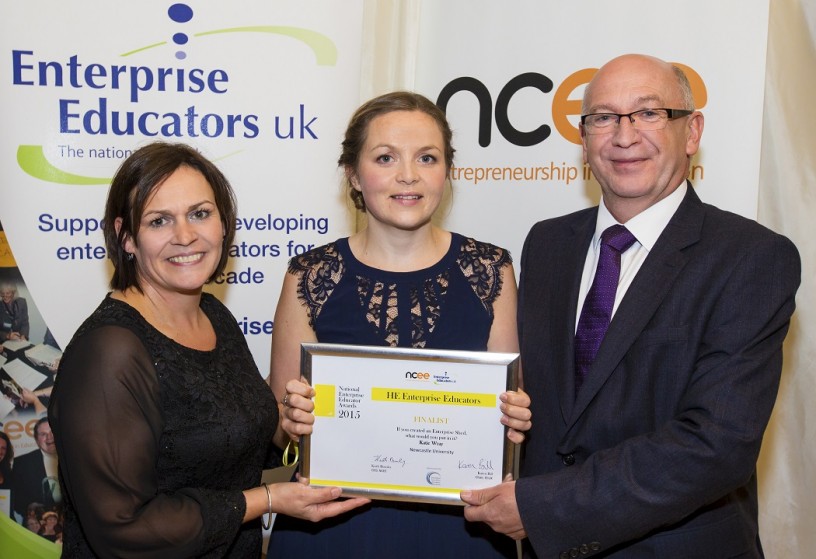In the spotlight:
Name: Katie Wray
Location: Newcastle upon Tyne, UK
Occupation: Lecturer in Enterprise (Science, Agriculture & Engineering), Newcastle University
You are an influential individual within the enterprise education space. What does ‘enterprise education’ mean to you?
Enterprise education is all about facilitating environments within which people can get together and test out their capacity to build ideas, implement projects, address societal challenges, and play around with their capabilities for intuitive thinking and opportunity spotting.
How did you first become involved with enterprise education?
I have been banging on about the importance of enterprise education for exactly 10 years now! The best thing I did during my own undergraduate degree was to undertake an ‘employment-related’ dissertation project. I had an interest (thanks to my Dad) in economic development, and in particular in what made a city stand out as a ‘Capital of Culture’ – a competition that was taking place in 2008 (Liverpool beat us, but that project created Newcastle Gateshead) – so I undertook a project with Newcastle City Council to look at enterprise and business support across the city region. What emerged was a need for high-growth, high-tech business support, and a new department – the City Technology Office (which later became Newcastle Science City) – was created. That got me engaging with enterprising students and staff at the University, and I found the startup scene way more interesting than the support for existing businesses. I wanted to be amongst the buzz of ideas generation, and to help make ideas happen, so I joined Newcastle University Careers Service in 2007 with a responsibility for embedding enterprise and entrepreneurship into the curriculum. I still do that now, but I work with science and engineering students specifically. They are great inventors and problem solvers, but are less aware of how to make their ideas happen. It is very rewarding to help them achieve that.
You specifically teach enterprise within the context of science, agriculture and engineering. What innovative teaching methods and practices do you use to introduce entrepreneurship to your students?
We use design projects that the students are already undertaking, and apply this design thinking to find commercial or societal-focused solutions to real problems that students identify in their discipline area. We largely tend to steer clear of ‘business startup’, and opt for an intra/entrepreneurial approach to making an impact as part of the curriculum, as the students have ambition to be working and living in many different future contexts.
How has enterprise education changed over the years, and how does it benefit students today?
Fundamentally, I don’t think it really has changed over the 10 years I have been involved. Instead, we as enterprise educators just get better at building a conversation around what we do and in tailoring ‘enterprise’ to the diversity of students and colleagues that we meet. We still have the same challenges, and despite some great progress in policy and QAA definitions, I feel that enterprise education requires individual flair to make it work for your particular style and in your particular surroundings.
Can enterprise be included at all stages of education, and within every subject? If yes, how? If no, why not?
Yes, it can. I have watched with interest the development of enterprise education at primary schools (Katy Walker and her colleagues at Brampton Primary in Cumbria are doing some great stuff within their PSHE curriculum), and through secondary and FE. By the time you get to HE, we must recognise the entrepreneurial competences and toolkits that our students already possess and build on them. And it is not just the PSHE curriculum; a number of years ago a colleague in Newcastle visited schools with an enterprise week focused on chocolate (the history of chocolate, the science of chocolate etc).
The debate around generic and discipline specific enterprise education continues, but my perspective is that there is so much diversity within a discipline that what is needed amongst any group of learners is a method to facilitate and inspire the self-directed development of individuals, rather than a syllabus-based journey through enterprise.

Katie Wray records ‘The Enterprise Shed’ podcast for Newcastle University’s online enterprise course
How do you evaluate and measure the success of enterprise education generally, and your own teaching innovations specifically?
Students should not be led to end in the same place (a standard summative assessment), but to have found their pathway through the things that interest them and the disciplines that they are looking to attain accreditation within (a portfolio approach). In general I see that enterprise educators measure their success on the stories and case studies that their learners leave with, rather than ratings against a student satisfaction framework. I would add to this that there is a great deal of success in sharing your approaches with other educators, who go on to try something new and find it rewarding. Impact is very important.
You are responsible for developing the enterprise programme at Newcastle University. What would you say to any institutions or academics who have still not included enterprise education within their curriculum?
I would firstly be amazed if there is such a thing as an institution with no enterprise! Enterprise is all around us, though it is only really ‘enterprise educators’ who identify and name it as such. I would set academics the challenge of teaching the same content, but teaching it in more enterprising ways, or ‘through’ entrepreneurship as a method.
There’s an age-old debate about whether entrepreneurs are born or made. Can you weigh into this?
I am asked this a lot. Personally, I feel that entrepreneurship is a skill and therefore it can be taught. What we cannot teach, however, is that critical part: the difference between those who will get up and do it, and those who won’t.
For students who don’t want to be entrepreneurs, what other benefits does enterprise education provide?
I think there is an inappropriately close connection between enterprise and entrepreneurship. I spend too much of my time as an enterprise educator talking about why what I am doing is not about business. What I am doing is enabling students to create value under whichever definition of ‘value’ they feel is important to them.
Where do you hope to see enterprise education in five years’ time?
I hope that we will ‘see’ less of it, but that the impact of enterprise education will be seen everywhere. Personally, I anticipate this being around interdisciplinary approaches to solving some of the world’s grand challenges, at a local and global level. Enterprise educators are great at facilitating groups of learners to find the things that they are good at – and that they enjoy – that can make a contribution to these solutions. We are also great at helping other educators who are looking for ways of making their own teaching more rewarding. I don’t think we are redundant quite yet!
What does a typical day look like in the world of Katie Wray?
I fully expect that everyone who answers this question says that there is no ‘typical day’. The part that I would say is typical, however, is the distracting power of a good news story from one of our students (or usually graduates – because isn’t hindsight a wonderful thing!). Other than that I can be found teaching, discussing ideas for new ways of teaching, meeting stakeholders who want to help shape our teaching, trying to share examples of impact with others, and then going home to think some more about what I might do differently tomorrow! Oh, and wittering on to my very patient colleagues about why we should be doing more!
And finally, Katie, tell us: if you were an animal, what would you be and why?
An octopus, because I need that many legs and arms to manage all the interesting things I say yes to.





Leave a Reply